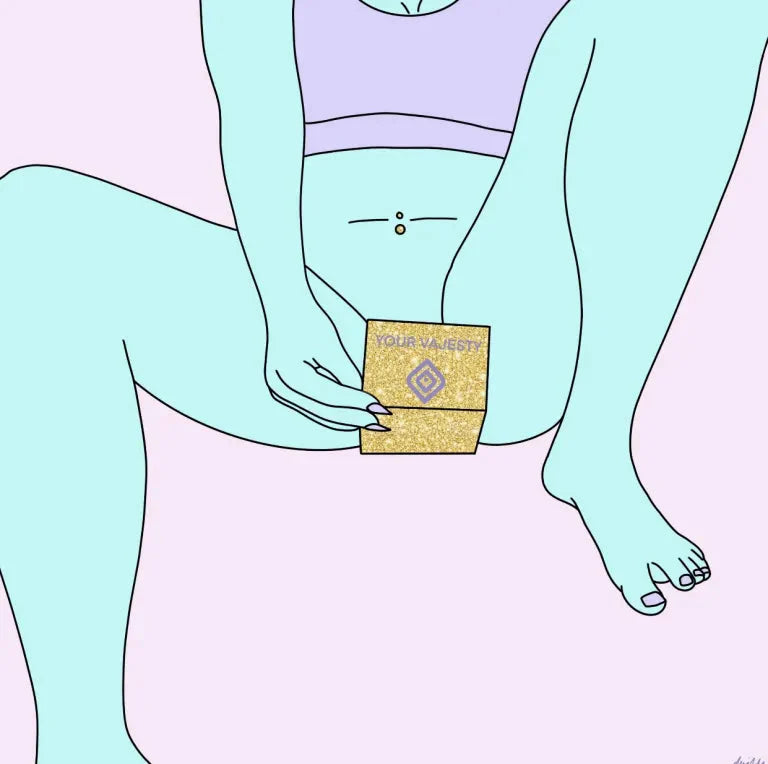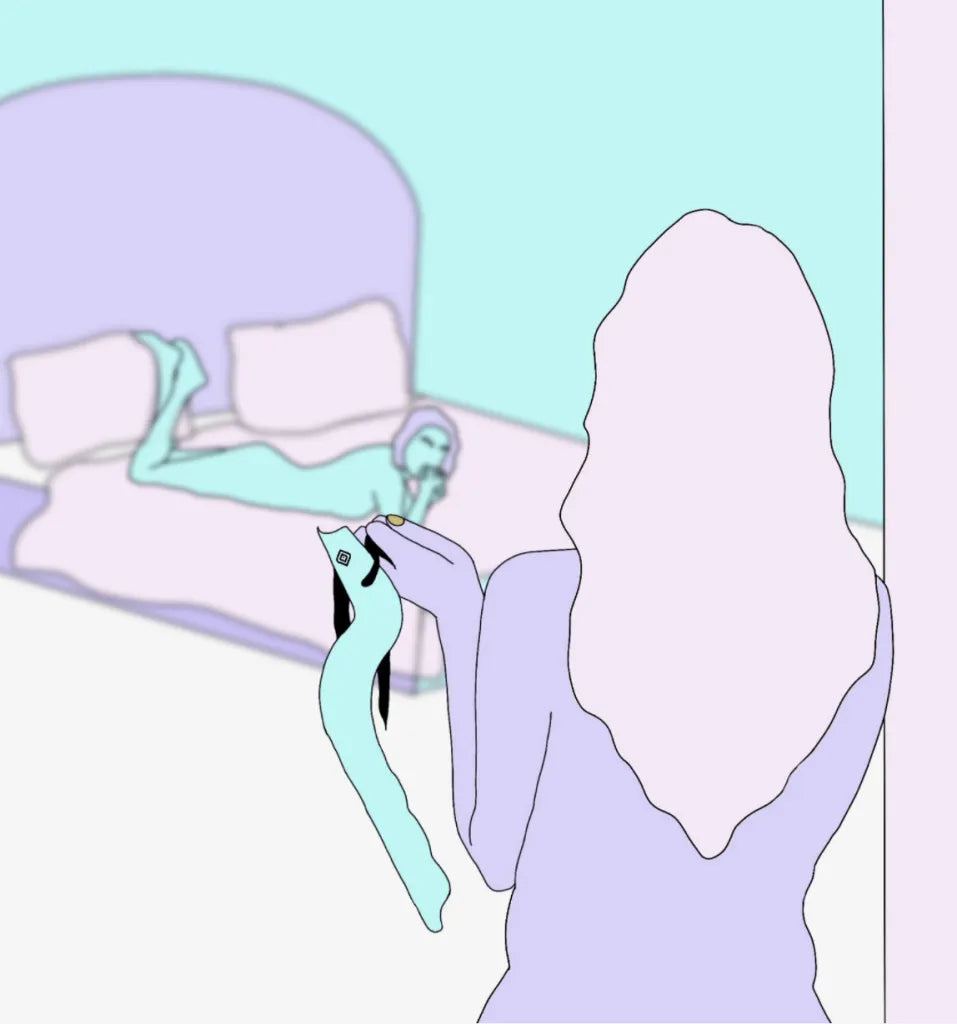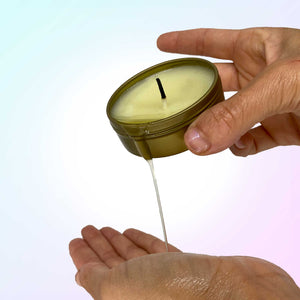Intro (Joint)
Hi. We thought you might have some questions about STIs. And while we may not have all the answers, we think that what we have learned since being diagnosed might be helpful.
We are Babe With the Power contributing writers Darcy and Veronica. We met through writing for this blog, and even though we live in different countries (on different sides of the world!), we’ve bonded and become friends over some of our shared experiences – especially our experiences with STIs.
Sharing Our Experiences With Herpes And HPV
We sat down to share our experiences and answers to frequently asked questions about Herpes and HPV, two incurable STIs. We especially want to share our journeys so that we can help destigmatize getting an STI. But more importantly, we want you to know that STIs are normal and nothing to be ashamed of. Even if some STIs aren’t curable, they are treatable. And maybe most important of all is that STIs haven’t changed our love for our bodies.
What STI Do You Have?
Darcy: I have genital herpes, otherwise referred to as G-HSV. There are two strains of herpes – one which causes cold sores on your mouth (HSV1), and one which causes sores on your genitals (HSV2).
Veronica: I have HPV which has many strains. It can cause a variety of issues, such as lesions, cancer, and/genital warts. HPV usually has no symptoms though, which was the case for me. Nearly all sexually active people will get it at some point in their life.
D: That’s so similar to herpes! Most people at some point in their life will have had it and most of the time, with very few if any symptoms. Just think about how common cold sores are. Unlike HPV though, herpes only has two strains, but both of them are passed through skin to skin contact which is why condoms don’t prevent transmission. The thing with herpes is that so many people have it and pass it on without even knowing they have it themselves.
V: That’s really similar to HPV — someone passed it to me and I had no idea. Which is why getting pap smears is so important. The main danger of HPV is that it can cause certain cancers if undetected- like cervical, vaginal or penile cancer in men.
Are HPV and Herpes Preventable? Any Treatments for Breakouts?
V: There is an HPV vaccine- and I got it when I was 13. That’s the age when most girls get the vaccine. It was recommended by my pediatrician. I got the 3 shots of the Gardasil vaccine. The shots only protect against certain strains though. It protects against the strains that cause 70% of cervical cancer as well as 90% of genital warts. If you haven’t had the vaccine yet, you can still get it up to age 26. It is most effective during adolescence, which is why it is recommended that most people get it when they are teens. Most men don’t get the vaccine because it was originally only given to women. It is now approved for men.
D: There isn’t a vaccine for herpes, but if you’re having a breakout, which you will know because of the appearance of sores in your genital area or cold sores on your mouth, your doctor will prescribe antiviral medication. These don’t cure you, but they do slash your rate of transmission as well as speed up the healing on the open sores. There are a lot of alleged home remedies for managing breakouts, but doctor-prescribed antiviral medication is the safest and most effective thing to take.
V: HPV can be spread through oral, anal, and vaginal sex, but is most common through vaginal and anal sex. As for preventing HPV, it’s important to use a barrier method. Condoms will help prevent getting most STIs.
How Is Herpes Transmission Different From Other STIs?
D: Herpes is different because it isn’t transmitted through fluids – like chlamydia and gonorrhea. As a result, condoms don’t prevent it from passing. Kissing passes HSV1 orally, and even some innocent dry-humping in just your underwear can pass HSV2 if there’s skin-to-skin contact!
V: I remember texting you about that for another blog I was working on. I didn’t realize herpes could be spread even if you’re using condoms!
D: Yeah that’s a really common misconception about herpes! Herpes is at the highest risk of transmission in the week before, during, and the week after a breakout. So any contact with the area is potentially passing it to someone else. A condom only prevents transmission if the breakout area is covered, which it often isn’t as genital herpes breakouts can also occur on the thighs and buttocks.
Any Common Signs Or Triggers To Detecting HPV or Herpes Breakouts?
V: With certain strains of HPV, some people may experience genital warts which are treatable. Most of the time, lesions from HPV can eventually go away on its own. Lesions are precancerous cells that can appear on the cervix or other areas. They are not painful and can only be found through a pelvic exam. When the lesions don’t go away, that’s when they can lead to cancer or genital warts.That’s why it’s important to get pap smears every few years.
D: Herpes outbreaks can also be triggered by stress and a lack of sleep as both of these things lower your immune system. So managing a healthy lifestyle can help prevent an outbreak, too.
V: For me, I only know when I have lesions on my cervix when I go to the doctor. Because lesions can be cancerous, it’s important that I get a pap smear every year. This year, the doctors didn’t detect anything though, which is great!
D: That’s great! I haven’t had a herpes outbreak in over a year which means that I am at a less than 4% chance of transmitting it to anyone!
How Did You Discover You Had An STI?
D: I’ve had my diagnosis for a year and a half now after finding a cluster of sores and heading to a walk-in sexual health clinic to get tested.
V: I found out I had HPV about a year ago after getting my first PAP smear at a routine doctor’s visit. HPV can only be found with a PAP smear or pelvic exam.
D: Damn, your first PAP smear?! What did they say?
V: They basically gave me a call with my results, and they told me not to worry too much. I was shocked though – I thought, I had been safe. I also had the vaccine, so I didn’t think I could get it.
D: I definitely felt the same. I was always so strict about safe sex and frequent STI kits. But herpes can’t be tested for unless you’re having an outbreak.
What Did The Doctor Give You To Treat Your Outbreak?
D: I was given a prescription of antivirals to take while waiting for the test results which came back positive a week later. I was told I had HSV1 on my genitals (instead of on my mouth where HSV1 usually appears). This means that I’d caught it when someone who had asymptomatic cold sores went down on me.
V: I never realized someone going down could be so risky. I guess it’s another common misconception that you can only get STIs if you have penetrative sex.
D: Exactly – I never knew either! So what happened with your diagnosis? Did they give you anything to treat it?
V: They didn’t give me anything to treat it because I had Low-Grade Squamous cells on my cervix, which are the least likely to cause cancer. I had no idea I had the abnormal cells because HPV is usually symptomless.
Did You Tell Your Partner(s)?
D: Yes! I was in a relationship at the time so I had the conversation with them.
V: How did they take it?
D: Well he told me he would be ashamed if I wrote publicly about it! Spoiler alert: I did it anyway.
V: That’s awful! My boyfriend at the time didn’t want me to talk to my friends about it, but ultimately, it’s my decision who I tell. We broke up a month or two later.
D: Good on you for not letting him tell you what to do! We broke up soon after, too, and I have disclosed herpes to every partner since. Weirdly, it’s not always recommended to disclose herpes because so many people have it and pass it on without knowing they have it themselves.
V: I also had a doctor tell me that I didn’t need to tell my partner! I was with a man at the time and there is no approved way to test for HPV in men.
D: I am very open and I think that if I know I have it, it is only right to disclose to other partners. This also gives me the chance to educate more people about it and to dismantle the stigma!
V: I agree. After some research, I decided I should tell any partners I come into contact with. HPV can be spread through any type of sex, sometimes even if condoms are used. Though it usually won’t affect the men I come in contact with, I feel responsible to make sure they know, in case they pass it on to a future partner.
How Does Having An STI Affect Your Life?
D: At first, I woke up every morning with the sinking realization that it wasn’t just a horrible dream and that I really did have herpes.
V: Same. I thought it would affect my life, but it really didn’t. I felt really ashamed about the diagnosis, and I didn’t know who to talk to.
D: I literally called my friend and asked her to come over and I had a cry and she bought me wine and takeout. It was a really nice way to spend my first night of being diagnosed!
V: I definitely called a friend crying, too. It’s easy to freak out about STIs because they’ve been stigmatized our whole lives.
D: Right. Especially when that stigma comes from jokes in the media! I didn’t realize how many jokes there were about herpes. Did you know there’s a herpes joke in Glee, of all things!?
V: Oh my god that’s so weird. How did that make you feel?
D: It was so weird. Really jarring, too? It was the first time I’d heard a herpes joke on TV since being diagnosed because it would have gone right over my head before. But it kind of sucked at the time. It felt uncomfortable to literally be the joke.
V: That’s awful. Especially since it’s already so hard to feel good about yourself after a diagnosis.
D: It definitely took a while to gain my confidence back through getting to educate people. I hope those people will then be more informed if anyone in their life is diagnosed with herpes.
V: I was also scared because I thought I was going to get cancer. My doctors assured me that the abnormal cells just mean I need to get a pap smear every year and monitor the cells to see if they change.
How Has Having An STI Changed Your Perception Of Life?
D: I went from thinking about herpes every day, to maybe once a week. It used to be the first thing I thought about in the morning and the last thing I thought about at night. Suddenly, I realized that whole months had passed without me even remembering that I have it!
V: I had the same thing! It felt like a nightmare when I was first diagnosed, but now I don’t think about it at all.
D: I’m a pretty open person so I like to indulge people who are curious about it and I hope that by being open, I show them that it isn’t a big deal – in some ways, having an STD has taught me a lot and made me stronger. It’s so important to normalize these conversations.
V: I’m also really open about my experience with HPV. It’s made me understand that STIs don’t define me, or anyone. They’re common, and they need to be talked about more so people don’t feel ashamed. We can prevent STIs and promote safe sex without shaming people for having sex or getting an STI.
D: I love this for us.
End (Joint)
We hope that you found something interesting or helpful in this little Q&A, Lova Babes! Remember, sometimes STIs happen, no matter how careful you were. You didn’t do anything wrong, and it doesn’t change who you are. And if you have any questions regarding any of the frequently asked questions about Herpes and HPV, please reach out in the comments or via our social accounts.
For more information on Herpes and HPV, check out:
- https://www.who.int/news-room/fact-sheets/detail/herpes-simplex-virus
- https://www.cdc.gov/hpv/parents/about-hpv.html
- https://www.cancer.org/cancer/cancer-causes/infectious-agents/hpv/hpv-vaccines.html
About The Authors
Veronica Mohesky is a University of Missouri graduate with a degree in Emerging Media Journalism. She graduated in December 2020 and works for a public television station as a digital media associate. Veronica loves to report on sexual health issues and believes it is important to have conversations to de-stigmatize sex, pleasure, and STIs. You can find her on Instagram at @veronicamohesky13.
Based in the UK, Darcy Rae is a BA and Masters by Research graduate in History specializing in medical history. Her work focuses on violence on the body, the evolution of public views on anatomy, and corporeal metaphors through time. This also includes the presentation of the female body and the expectations of female dignity before public execution. Darcy is also a self-taught digital illustrator; this fascination with anatomy is also found in her work which combines messages of body positivity and female empowerment.
More Articles You Might Love

Get To Know Your Vulva





















